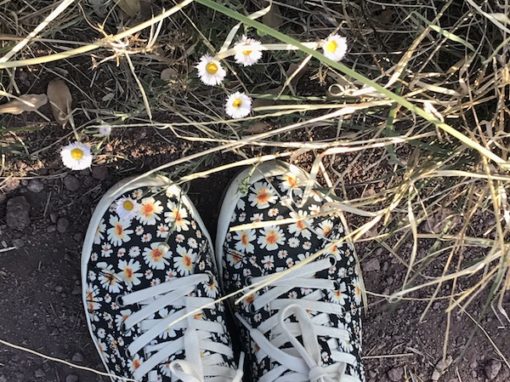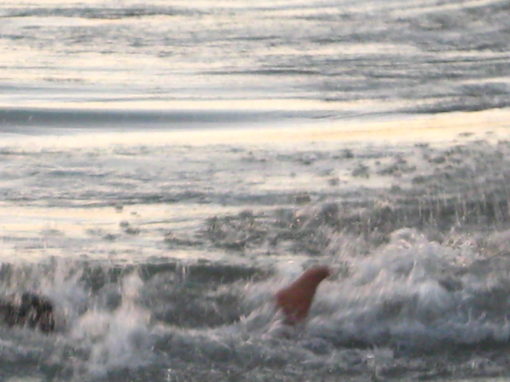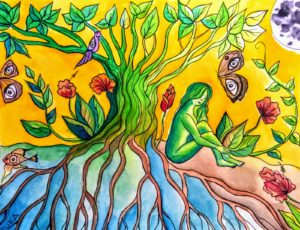“I’m sick of him,” my student said. “He doesn’t understand anything about equality or sexism or how women might be feeling. He doesn’t want to listen. I’m just done. I don’t have any energy left for him. I don’t even want to talk.”
When leading international semester programs, my work before this pandemic, I constantly found myself in the position of facilitator-mentor-teacher-counselor-friend-listener. It is exhausting, enthralling work. All humans are works in progress; teenagers just tend to show it in the raw. It’s a place where we can dive into conflict together: imperfect, messy, trying. I continue to practice releasing my ego from this role: it’s not about what I do or say, but if I can step back and let what needs to be felt, be felt, what needs to be said, to be said. More often than not, people just need someone to listen and care.
In this scenario, one of my students, a female-identifying student, was furious towards one of the male-identifying students. His comments were hurtful, and his intentions, though not necessarily malicious, were not entirely without fault. He was the type of human who challenges everything: every construct, every assignment, every critique, every piece of feedback. After over a week of hiking together for hours on end, sharing every meal together, and being around one another 24/7, the inevitable tensions were rising to the surface, and this female student wasn’t going to stay silent. Rightfully so. She needed to challenge his words. It wasn’t just about him, of course. It’s about the patriarchy.
Before I left for this semester, I had received about 30 minutes of Nonviolent Communication training. Notice. Feelings. Needs. Requests. Got it. Sort of. I had paper cards in my backpack, crumpled pieces of paper with feelings and needs written on them. Feelings like anxious, angry, hopeful. Needs like belonging, hope, equity. There were about 50 Feelings and 50 Needs, each on their own card. What the hell do I do with these? I tried to remember.
Nonviolent Communication is a study into the feelings and needs of humans. It arose through the work of Marshall Rosenberg, a white Jewish man who grew up in Detroit in the 1960s. He is not a nice person (he says this of himself; others say this of him too) and yet, compassion and connection were two of his life purposes. He believed that this language of communicating was a way to increase empathy amongst humans with differences. Connection was the ultimate goal. By understanding what needs were really present, one could create their own strategies to get those needs met.
“In today’s America, we tend to think of healing as something binary: either we’re broken or we’re healed from that brokenness. But that’s not how healing operates, and it’s almost never how human growth works.”
Resmaa Menakem, “My Grandmother’s Hands”
There is a lot to explore with NVC. There are moments I feel it falls short systemically, when I want to weave in privilege and fragility and power, and I’m finding the ways how. There are moments I get angry with the simplicity of a feeling or a need, or I can bristle with some of the language: Are you feeling __ because you need ___? And yet, there is a steady, pulsing power to these practices. The more I use frameworks for connecting, the more I remove my ego. It’s not about me guessing someone’s need when they’re telling me something painful. It’s about being with them. It’s about being a mirror, so they can also see themselves.
I struggle with social interactions. Not many people know that. One of my greatest needs is belonging. I moved, so much, as a kid that I always wanted to figure out HOW I could belong. So I tried to befriend “popular” people for a time. I dated the “popular” boys for a time. I played sports and explored art and did my classwork, applied for student government, joined a sorority in college, seeking my own communities of belonging. I come off full of energy and light, and my bubbly nature is something I love about myself. My therapist tells me I get excited with the world, and that is true. And, there is a lot of pain, healing, trauma that I need to do: individually, interpersonally, and collectively as a white person in a white supremacist society.
Resmaa Menakem, author of “My Grandmother’s Hands,” has created one of the most powerful anthologies of practice and theory I have ever read. It is a study into black, white and police bodies and how trauma lives in all of them. One of the premises I’ve taken away is that white bodies first colonized one another before they colonized “other” bodies. There is much about the creation of the race of whiteness, and all the ways in which whiteness created in the US has influenced apartheid in South Africa and Nazism in Germany. This country, my country, especially from the white perspective, as a lot of deep seeded NEEDS to explore and FEELINGS that need to be aired. Menakem writes,
“The trauma that now lives in the bodies of so many African Americans did not begin when those bodies first encountered white ones. This trauma can be traced back much further through generation upon generation of white bodies to medieval Europe. For America to outgrow the bondage of white supremacy, white Americans need to imagine themselves in Black bodies and experience what those bodies had to endure. They also need to do the same with the bodies of their own white ancestors. And they need to ask themselves this question: “If we don’t address our ancient historical trauma, what will we pass dow to our children, and to their children and grandchildren?”
In the last year and a half, I’ve fallen into an NVC/white supremacy/somatic experience rabbit hole. To be fair, this unlearning probably began in a sociology class at UNC-Chapel Hill and has continued in doses and spurts ever since. Oh, the privilege of comfort, that this unlearning can happen when I have time for it to rather than every minute, every day. I’m trying.
NVC helps me identify what I actually NEED and FEEL. And honestly, in the patriarchy that this country STILL is, that is hard for me as a cis-gendered woman to do. What do I actually want? What do I need? What do I feel? This is a HUGE unlearning process.
Right now, everyone is going through something difficult. The pandemic continues to be our landscape, but beyond that, there are fears manifesting like weeds. As a country we’ve witnessed deaths of innocent Black humans for decades; we’ve also witnessed the Black joy, indigenous pride, Latina/o/x claiming of space. We’ve witnessed a rise in Asian hate crimes. I’ve heard little boys tell their educators that COVID doesn’t exist; the Chinese just made it up– at least, “that’s what my dad said.” There are millions of collective global deaths due to the virus. Unemployment continues. People still wait for a check, a promise, of some small salve from the government. Cities and states have reopened, now closed again as the second strand of the virus works its way through the landscape. I feel a despair, an out of body realization, as my mind works to unravel all the intersectional threads that are at play, everyday, in our lives.
COVID has shed light on the inequalities that might be obscure in your daily view if you are white, middle class, able-bodied, have health care. Though it’s not an exact science, I’ve come to believe that the more people you know affected by COVID, the more marginalized you are in this country. For me, there aren’t many people I know in my immediate circle. Totally different from a student at a school where I teach experiential education– it’s a school that specifically serves students living below the poverty line. One student there knows ten people in his immediate circle who have died because of COVID. And yet, no matter who you are, every single person has been affected by this virus in some way, including white, able-bodied, cisgendered, upper class folks.
The question, though, is whether those of us who are more sheltered because of our privileges will allow ourselves to truly feel the pain, the despair, the utter sadness of what it means to watch someone you love from behind a glass window? To not hold their hand for weeks on end? To wait, and wonder, and hope, and then worry– if they do survive, what will life look life afterwards?
COVID illuminates the decaying structures. Structures that decay, are cracked, and broken, were never strong to begin with. We know this country was built on racist, sexist, classist principles. Race is the child of racism, a way to separate the classes, diffuse the masses, and control. Capitalism that promises meritocracy as the pathway toward success. Sexism that continues to tell women and female-identifying people that their voice does not matter as much as that of men. These realities are part of what one must learn, and keep learning, and unlearn, and keep learning, and unlearn.
In the midst of such change, finding strategies, methodologies, that work for each of us is part of our life work. NVC has become a soothing balm to remember that ultimately, I am responsible for knowing my own needs, for identifying my feelings, and for creating a strategy with what I have, in this moment, as I move forward into the unknown. It’s learning, ‘How can I settle in times of uncertainty?’ This country is at a time of uncertainty. It’s a time to continually reexamine ourselves, our communities, and our world.
Let’s look at who we’ve been.
Let’s think about who we want to be.
Let’s listen to the complexity of different identities we all hold.
Let’s strive to make collective liberation a reality.




